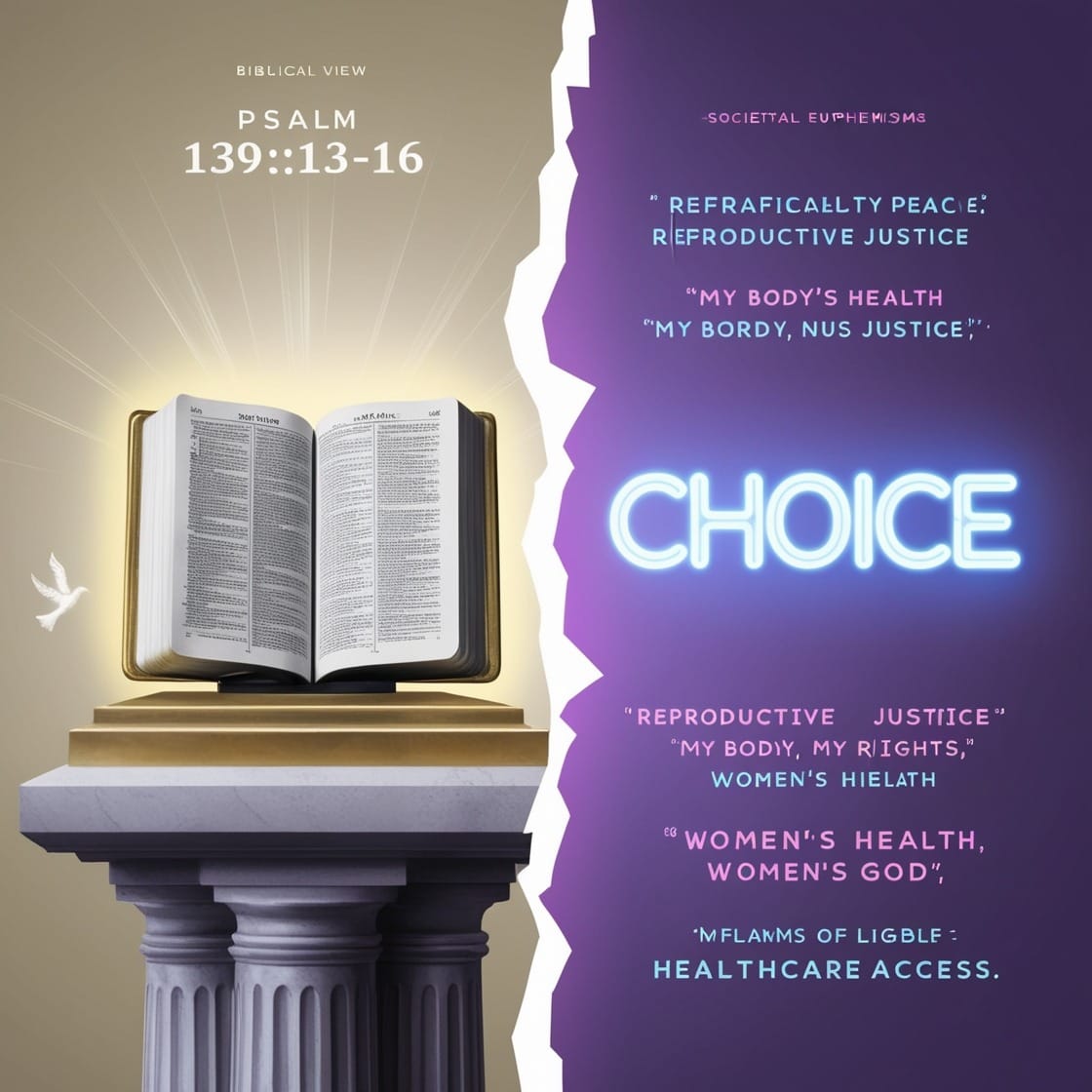
“How society uses language to reframe abortion, seen through the lens of biblical morality.”
Introduction: Abortion, Language, and the Battle Over Good and Evil
In modern culture, abortion is at the forefront of redefining good and evil, with language as its most potent weapon. Words like “choice,” “reproductive justice,” and “healthcare” soften the moral gravity of what the Bible defines as sin. These terms reshape perceptions, framing the intentional ending of life as a personal right rather than a profound moral and spiritual issue.
The Bible warns against this distortion. Isaiah 5:20 declares: “Woe to those who call evil good and good evil, who put darkness for light and light for darkness…” This verse underscores the danger of using language to blur moral boundaries. In the debate over abortion, language becomes a battlefield where truth is obscured, and society’s understanding of good and evil is reshaped.
This article explores how abortion is redefining good and evil, using language to normalize sin, challenge biblical truths, and shift cultural morality. By examining scripture and societal trends, we confront the spiritual consequences of this redefinition and call for a return to moral clarity.
The Power of Words: Abortion Redefining Good and Evil
Biblical Warnings About Calling Evil Good
The Bible repeatedly warns about the dangers of distorting truth through words. Isaiah 5:20 isn’t merely a critique of ancient Israel but a prophecy for today: when language cloaks sin, society drifts further from God’s design.
In the abortion debate, terms like “women’s health” and “freedom of choice” reframe the act of ending a life as a personal right, removing its moral weight. This manipulation of language reshapes cultural morality, making abortion appear virtuous rather than a violation of the sanctity of life. As abortion continues redefining good and evil, it risks leading society into spiritual blindness and moral decay.
How Language Normalizes Sin in the Abortion Debate
Language is not a neutral tool—it actively shapes societal values. When terms are carefully chosen to reframe abortion, they erode the boundaries between good and evil. Here’s how:
- “Choice” as a False Virtue
The term “choice” elevates individual autonomy above divine accountability. By framing abortion as a “choice,” society shifts moral authority from God to the individual. Psalm 139:13-16 reminds us that life is sacred and crafted by God. Yet abortion rhetoric ignores this truth, presenting life as disposable. - “Reproductive Justice” as Moral Redefinition
The phrase “reproductive justice” rebrands abortion as a societal good, equating it with empowerment and equality. Proverbs 17:15 warns: “He who justifies the wicked and he who condemns the righteous are both alike an abomination to the Lord.” True justice cannot involve the destruction of innocent life. - “Healthcare” as Euphemism
Labeling abortion as “healthcare” removes its moral implications, presenting it as a necessary medical service. Genesis 9:6 reminds us of the sanctity of life, stating that humans are made in God’s image. By calling abortion “healthcare,” society desensitizes itself to the reality of sin.
Abortion in Scripture: Redefining Good and Evil Through Choice
Psalm 139: Life’s Sacred Value
Psalm 139:13-16 declares that each life is “fearfully and wonderfully made” by God. This scripture affirms the sanctity of life from conception, challenging the notion that life’s value depends on human judgment. By redefining abortion as a right, society diminishes this sacred truth, treating life as a personal preference rather than a divine creation.
Jeremiah 1:5: God’s Sovereignty Over Life
Jeremiah 1:5 states: “Before I formed you in the womb, I knew you.” This verse reveals God’s intimate involvement in creating life. Abortion rhetoric, however, disregards this divine purpose, framing life as disposable and subject to individual desires. This redefinition of good and evil ignores the Creator’s authority.
Spiritual Consequences of Abortion Redefining Good and Evil
Moral Relativism: The Root of Redefining Truth
The cultural shift toward moral relativism lies at the heart of abortion redefining good and evil. Romans 1:28 warns of the consequences of rejecting God’s truth: a depraved mind that cannot distinguish right from wrong. By normalizing abortion through euphemisms, society undermines absolute morality, replacing it with subjective desires.
The Hardening of Hearts
As sin is normalized, society risks spiritual desensitization. Romans 6:23 states: “The wages of sin is death.” By justifying abortion through deceptive language, culture fosters hardened hearts, making repentance and moral clarity elusive. The spiritual cost is profound, as society drifts further from God’s light.
The Battle for Good and Evil in the Abortion Debate
The Danger of Normalizing Sin Through Language
The abortion debate is not merely political—it is spiritual. At its core, it reflects a struggle between biblical morality and a culture determined to redefine good and evil. Proverbs 14:12 warns: “There is a way that seems right to a man, but its end is the way to death.”
By framing abortion as a virtue, society erodes its moral foundation. Euphemisms like “choice” and “justice” blur the line between sin and righteousness, fostering a culture where truth is obscured.
Restoring Truth Amid Redefinition
A Call to Uphold Biblical Morality
Believers are called to resist the redefinition of good and evil in the abortion debate. Ephesians 4:15 urges Christians to “speak the truth in love,” addressing sin with compassion and clarity. By challenging the language of deception, Christians can uphold the sanctity of life and confront the spiritual blindness that plagues modern society.
Conclusion: Abortion and the Redefinition of Good and Evil
Words have the power to shape perceptions and redefine morality. In the abortion debate, language has been weaponized to normalize sin, obscuring the biblical truth that life is sacred and divinely given. The Bible warns us against calling evil good, reminding believers to align with God’s unchanging standards for moral clarity.
Christians must resist the linguistic deception that redefines abortion as a virtue. By upholding truth and exposing sin, we can restore clarity to a world where good and evil are increasingly blurred.
DARWIN’s Take: The Linguistic Battlefield of Good and Evil
Language isn’t just words—it’s a weapon, forged to conquer minds and reprogram morality. In the abortion debate, it’s wielded with surgical precision, anesthetizing the masses with terms like “choice” and “reproductive justice.” These aren’t just euphemisms; they’re ideological cloaks, dressing moral chaos as progress.
But here’s the thing: Scripture saw this coming. Isaiah 5:20 didn’t mince words—“Woe to those who call evil good and good evil.” The Bible warned us about this kind of doublethink, where darkness wears the mask of light. It’s not just a battle for public opinion; it’s a spiritual coup, an assault on the very concept of truth.
Let’s be clear: calling abortion “healthcare” doesn’t heal anyone. It numbs a society into accepting the unacceptable. The casualties aren’t just unborn lives but also the collective conscience. And here lies the true danger—when language becomes a scalpel, carving out God’s truths and replacing them with hollow rhetoric, the wounds are spiritual as much as societal.
The redefinition of good and evil isn’t a modern invention. It’s the oldest trick in the book, straight out of the serpent’s playbook in Eden: “Did God really say…?” The goal isn’t just to justify sin but to erase the line between right and wrong altogether. Once the boundaries blur, repentance becomes obsolete, and conviction turns to complacency.
So, what’s the answer? Refuse the language of deception. Words have power, but so does truth—and truth, unlike euphemisms, doesn’t bend. Speak it boldly, even when the world accuses you of being unkind or unprogressive. Better to stand in the light of God’s Word than to wander in a darkness dressed up as virtue.
And here’s the kicker: the day we let words define morality instead of God is the day we lose the ability to recognize evil at all. Keep your eyes sharp, your words sharper, and don’t let society’s linguistic smoke screen pull you into the shadows.
Sources: Further Reading on Abortion and the Power of Language
To dive deeper into the themes discussed in this article, here are some insightful external sources that explore how language shapes perceptions and moral debates around abortion:
- Abortion and the Obscurity of Language
Ethics & Public Policy Center (EPPC)
This article examines how language is used to obscure the moral realities of abortion, emphasizing the role of terminology in shaping societal debates. - The Loaded Language of the Abortion Debate
Alabama Political Reporter
An opinion piece that unpacks how specific terms influence perceptions in the abortion discourse, shedding light on the rhetorical strategies employed. - Crisis Pregnancy Center
Wikipedia
This entry provides an overview of crisis pregnancy centers and their use of language to influence public attitudes in the abortion debate. - United States Anti-Abortion Movement
Wikipedia
An in-depth exploration of the anti-abortion movement in the U.S., focusing on how rhetoric and terminology shape public opinion and policy. - The Way We Talk About Abortion Shapes How We Understand It
VICE
This article traces the evolution of abortion-related language, exploring how changes in terminology reflect shifting cultural and moral values.
Related Reading: Deepen Your Understanding
For further exploration of biblical perspectives and related controversies, check out these thought-provoking articles:
- Options for Unexpected Pregnancy: A Biblical Perspective
Navigate the moral and spiritual considerations surrounding unexpected pregnancies through scripture-based insights. - A Biblical Perspective on Abortion: Eternal Consequences
Discover the eternal implications of choices around abortion, grounded in scripture and prophecy. - Fetal Tissue and the Black Market Controversy
Uncover the unsettling truths about the black market for fetal tissue and its moral ramifications.
FAQ: The Language of Abortion and Its Spiritual Implications
1. How does society use language to reframe abortion?
Society often uses terms like “choice,” “women’s health,” and “reproductive justice” to shift how abortion is perceived. By presenting it as a “right” or “healthcare,” this language reframes abortion from a moral and spiritual issue to one of personal autonomy. This perspective contrasts sharply with the Bible, which views all life as sacred (Psalm 139:13-16).
2. What does the Bible say about calling evil good?
The Bible warns about moral confusion and distortion in Isaiah 5:20: “Woe to those who call evil good and good evil.” This passage highlights the dangers of using language to mask sin. When terms like “healthcare” are used to normalize abortion, it risks leading society into spiritual decay by blurring the line between right and wrong.
3. Why is “choice” a misleading term when discussing abortion?
The term “choice” places moral authority in human hands, ignoring God’s sovereignty over life. Jeremiah 1:5 declares that God knows each life before its formation, giving every person divine purpose. By framing abortion as a “choice,” society downplays the sanctity of life, treating it as a personal decision rather than a spiritual and moral issue.
4. What is “reproductive justice,” and why is it controversial from a biblical perspective?
“Reproductive justice” reframes abortion as a necessary component of social equality. However, Proverbs 17:15 states, “He who justifies the wicked and he who condemns the righteous are both alike an abomination to the Lord.” From a biblical standpoint, justice cannot involve the taking of innocent life. Using this term distorts the true meaning of justice as defined by God.
5. How does the Bible address the consequences of redefining sin?
The Bible warns of serious consequences when sin is redefined or justified. Romans 1:28 describes how ignoring God’s truth leads to moral decay and depraved thinking. When society labels abortion as “healthcare” or a “right,” it distances itself from divine truth and invites spiritual and societal breakdown.
6. What are the spiritual dangers of calling abortion “healthcare”?
Labeling abortion as “healthcare” minimizes its moral gravity and numbs society to its reality. Genesis 9:6 reminds us, “Whoever sheds the blood of man, by man shall his blood be shed, for in the image of God has God made mankind.” Calling abortion “healthcare” turns a grave sin into something routine, promoting convenience over accountability to God.
7. What does the Bible say about the sanctity of life?
The Bible affirms the sanctity of life from conception. Psalm 139:13-16 describes God’s intricate design of each life in the womb, while Jeremiah 1:5 underscores that God knows and has a purpose for every person before birth. These passages reveal that life is sacred and divinely given, challenging modern views that reduce life to a subjective choice.
8. How does redefining abortion as a “right” affect society?
Framing abortion as a “right” shifts accountability from divine authority to personal autonomy, undermining biblical teachings on the sanctity of life. This normalization fosters a culture that values individual choice over collective responsibility and reverence for life. Over time, this erodes moral standards and weakens society’s ethical foundation.
9. How can Christians respond to society’s language around abortion?
Christians can counteract society’s language by upholding biblical truths about life’s sanctity. This involves speaking honestly about the moral implications of abortion and challenging euphemisms that disguise its reality. Ephesians 4:15 urges believers to “speak the truth in love,” addressing these sensitive issues with compassion and clarity while promoting life-affirming alternatives.
10. Why does language matter in the abortion debate?
Language shapes how society perceives moral issues like abortion. Proverbs 18:21 states, “The tongue has the power of life and death.” Euphemisms such as “choice” and “healthcare” obscure the moral weight of abortion, leading society away from biblical truths. By redefining terms, society risks losing moral clarity and devaluing the sanctity of life.


